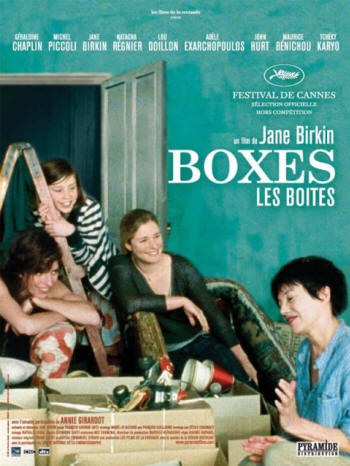Aidan Curran posted on November 19, 2007 09:18
Have our Dublin readers been along to the French Film Festival at the IFI? Seen anything interesting? Looking over the programme online, we saw that there's a screening of 'Ensemble C'est Tout' starring the lovely Audrey Tautou (Ah, if only everything in life were as lovely as the lovely Audrey Tautou). Also showing is petulant French footballer Vikash Dhorasoo's 'Substitute', where the ex-PSG player filmed (from the bench) les bleus' epic 2006 World Cup adventure.
 Not forgetting romantic comedy 'Prête-Moi Ta Main' (here given the bland English title of 'I Do'; surely the literal translation - 'Lend Me Your Hand' - would have been better, given the film's storyline of a woman pretending to be a man's fiancé?) with the über-cool Charlotte Gainsbourg.
Not forgetting romantic comedy 'Prête-Moi Ta Main' (here given the bland English title of 'I Do'; surely the literal translation - 'Lend Me Your Hand' - would have been better, given the film's storyline of a woman pretending to be a man's fiancé?) with the über-cool Charlotte Gainsbourg.
As it happens, Charlotte's mammy has a film at the festival too - 'Boxes' is Jane Birkin's directorial debut. It's autobiographical; Birkin stars as an Englishwoman looking back over her French life and loves. The film features John Hurt, Geraldine Chaplin and model/actress Lou Doillon - Charlotte's half-sister and Birkin's youngest daughter. Despite the mixed reviews it got from French cinema critics, it may still be of interest to Francophiles.
Birkin is, of course, famous for being the collaborator, muse and partner of Serge Gainsbourg. Regardless of how her directing career unfolds, her most celebrated contribution to popular culture will probably always be the long orgasmic groan that fades out 'Je T'aime (Moi Non Plus)', still pop's most notorious single.
The BBC banned it, the Vatican condemned it; unsurprisingly it shot to number one across Europe in 1969 and 1970. Apart from Birkin's suggestive sound effects, the lyrics are surprisingly unerotic - the most offended were probably ultra-Catholics ("l'amour physique et sans issue" - physical love without offspring, or without exit) and consultant proctologists ("je vais et je viens / Entre tes reins" - I come and I go between your kidneys). Gainsbourg wrote the song as a glib throwaway, and later regretted that outside France his entire career and work was reduced to this one single.
We've been told that the strange title - I Love You (Me Neither) - was apparently inspired by a French politician, perhaps Georges Pompidou of the ugly art gallery in Paris today, who hit upon the phrase 'moi non plus' as a way of worming out of a difficult question by appearing to both agree and disagree with the proposition - or at least to confuse the interviewer. But we haven't found any confirmation of this theory.
The song was originally written for Gainsbourg's previous lover/muse, Brigitte Bardot, in the manner of their 1967 duet 'Bonnie And Clyde', one of the greatest pop singles of the 1960s. However, Bardot objected to the finished version's sauciness and put her foot down; the single was never released. Today, listening to it on Serge compilations, perhaps she was justified on purely musical grounds - the poppy, jangly Bardot version is vastly inferior to the lush, soulful Birkin one.
 But how did the English girl come to sing on France's most famous pop song? Well, Gainsbourg and Birkin met in 1968 when the actress screen-tested for a part in a French movie called 'Slogan'. She had previously caused moral outrage for her role in Michelangelo Antonioni's classic Swinging London film 'Blow Up', where she became the first mainstream cinema actress to appear as a full-frontal nude on screen. Once she moved to Paris and played Gainsbourg's muse, Birkin became an icon in France; Hermès named one of its luxury handbags after her.
But how did the English girl come to sing on France's most famous pop song? Well, Gainsbourg and Birkin met in 1968 when the actress screen-tested for a part in a French movie called 'Slogan'. She had previously caused moral outrage for her role in Michelangelo Antonioni's classic Swinging London film 'Blow Up', where she became the first mainstream cinema actress to appear as a full-frontal nude on screen. Once she moved to Paris and played Gainsbourg's muse, Birkin became an icon in France; Hermès named one of its luxury handbags after her.
In 1975 Gainsbourg made a film starring Birkin called 'Je T'Aime (Moi Non Plus)': a Lars von Triers-esque tale of passionless sex and confused sexuality in a dreary small town. Birkin received great praise for her performance; from that point on she seems to have been taken more seriously as an actress by the French cinema establishment.
Birkin continues to sing and act. She was a special guest of the Dublin French Film Festival in 2003, and while in Ireland she performed a concert of Gainsbourg re-interpretations at Liberty Hall. Her solo albums are also critically acclaimed in France; in 1992 she was named Female Artist Of The Year in the French music industry's prestigious Victoire de la Musique awards.
The masterpiece of Serge and Jane's collaboration is unquestionably Gainsbourg's electrifying 1971 album 'Histoire De Melody Nelson', one of the few absolutely essential and globally influential French records. That said, the wider world will probably always hear their name and think immediately of a soulful bassline, a wistful organ melody and an English girl's groans. Here's the video for 'Je T'Aime (Moi Non Plus); sorry, but it's not a 'making-of' film:
More ...
[Read More...]